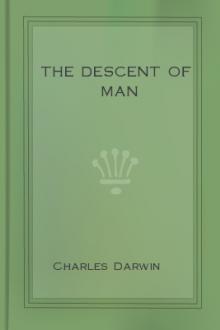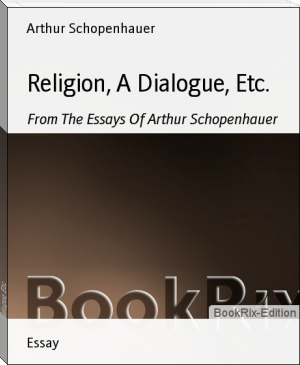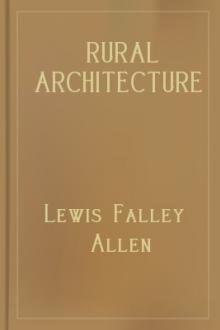Studies in Pessimism - Arthur Schopenhauer (books like harry potter .TXT) 📗

- Author: Arthur Schopenhauer
Book online «Studies in Pessimism - Arthur Schopenhauer (books like harry potter .TXT) 📗». Author Arthur Schopenhauer
all philosophers! and if a man of my age lets himself in for a quarter-of-an-hour's talk with such fools, it is only because it amuses me and passes the time. I've more important business to attend to, so Good-bye.
PSYCHOLOGICAL OBSERVATIONS.
There is an unconscious propriety in the way in which, in all European languages, the word person is commonly used to denote a human being. The real meaning of persona is a mask , such as actors were accustomed to wear on the ancient stage; and it is quite true that no one shows himself as he is, but wears his mask and plays his part. Indeed, the whole of our social arrangements may be likened to a perpetual comedy; and this is why a man who is worth anything finds society so insipid, while a blockhead is quite at home in it.
* * * * *
Reason deserves to be called a prophet; for in showing us the consequence and effect of our actions in the present, does it not tell us what the future will be? This is precisely why reason is such an excellent power of restraint in moments when we are possessed by some base passion, some fit of anger, some covetous desire, that will lead us to do things whereof we must presently repent.
* * * * *
Hatred comes from the heart; contempt from the head; and neither feeling is quite within our control. For we cannot alter our heart; its basis is determined by motives; and our head deals with objective facts, and applies to them rules which are immutable. Any given individual is the union of a particular heart with a particular head.
Hatred and contempt are diametrically opposed and mutually exclusive. There are even not a few cases where hatred of a person is rooted in nothing but forced esteem for his qualities. And besides, if a man sets out to hate all the miserable creatures he meets, he will not have much energy left for anything else; whereas he can despise them, one and all, with the greatest ease. True, genuine contempt is just the reverse of true, genuine pride; it keeps quite quiet and gives no sign of its existence. For if a man shows that he despises you, he signifies at least this much regard for you, that he wants to let you know how little he appreciates you; and his wish is dictated by hatred, which cannot exist with real contempt. On the contrary, if it is genuine, it is simply the conviction that the object of it is a man of no value at all. Contempt is not incompatible with indulgent and kindly treatment, and for the sake of one's own peace and safety, this should not be omitted; it will prevent irritation; and there is no one who cannot do harm if he is roused to it. But if this pure, cold, sincere contempt ever shows itself, it will be met with the most truculent hatred; for the despised person is not in a position to fight contempt with its own weapons.
* * * * *
Melancholy is a very different thing from bad humor, and of the two, it is not nearly so far removed from a gay and happy temperament. Melancholy attracts, while bad humor repels.
Hypochondria is a species of torment which not only makes us unreasonably cross with the things of the present; not only fills us with groundless anxiety on the score of future misfortunes entirely of our own manufacture; but also leads to unmerited self-reproach for what we have done in the past.
Hypochondria shows itself in a perpetual hunting after things that vex and annoy, and then brooding over them. The cause of it is an inward morbid discontent, often co-existing with a naturally restless temperament. In their extreme form, this discontent and this unrest lead to suicide.
* * * * *
Any incident, however trivial, that rouses disagreeable emotion, leaves an after-effect in our mind, which for the time it lasts, prevents our taking a clear objective view of the things about us, and tinges all our thoughts: just as a small object held close to the eye limits and distorts our field of vision.
* * * * *
What makes people hard-hearted is this, that each man has, or fancies he has, as much as he can bear in his own troubles. Hence, if a man suddenly finds himself in an unusually happy position, it will in most cases result in his being sympathetic and kind. But if he has never been in any other than a happy position, or this becomes his permanent state, the effect of it is often just the contrary: it so far removes him from suffering that he is incapable of feeling any more sympathy with it. So it is that the poor often show themselves more ready to help than the rich.
* * * * *
At times it seems as though we both wanted and did not want the same thing, and felt at once glad and sorry about it. For instance, if on some fixed date we are going to be put to a decisive test about anything in which it would be a great advantage to us to come off victorious, we shall be anxious for it to take place at once, and at the same time we shall tremble at the thought of its approach. And if, in the meantime, we hear that, for once in a way, the date has been postponed, we shall experience a feeling both of pleasure and of annoyance; for the news is disappointing, but nevertheless it affords us momentary relief. It is just the same thing if we are expecting some important letter carrying a definite decision, and it fails to arrive.
In such cases there are really two different motives at work in us; the stronger but more distant of the two being the desire to stand the test and to have the decision given in our favor; and the weaker, which touches us more nearly, the wish to be left for the present in peace and quiet, and accordingly in further enjoyment of the advantage which at any rate attaches to a state of hopeful uncertainty, compared with the possibility that the issue may be unfavorable.
* * * * *
In my head there is a permanent opposition-party; and whenever I take any step or come to any decision - though I may have given the matter mature consideration - it afterwards attacks what I have done, without, however, being each time necessarily in the right. This is, I suppose, only a form of rectification on the part of the spirit of scrutiny; but it often reproaches me when I do not deserve it. The same thing, no doubt, happens to many others as well; for where is the man who can help thinking that, after all, it were better not to have done something that he did with great deliberation:
Quid tam dextro pede concipis ut te
Conatus non poeniteat votique peracti ?
* * * * *
Why is it that common is an expression of contempt? and that
uncommon, extraordinary, distinguished , denote approbation? Why is everything that is common contemptible?
Common in its original meaning denotes that which is peculiar to all men, i.e ., shared equally by the whole species, and therefore an inherent part of its nature. Accordingly, if an individual possesses no qualities beyond those which attach to mankind in general, he is a common man. Ordinary is a much milder word, and refers rather to intellectual character; whereas common has more of a moral application.
What value can a creature have that is not a whit different from millions of its kind? Millions, do I say? nay, an infiniture of creatures which, century after century, in never-ending flow, Nature sends bubbling up from her inexhaustible springs; as generous with them as the smith with the useless sparks that fly around his anvil.
It is obviously quite right that a creature which has no qualities except those of the species, should have to confine its claim to an existence entirely within the limits of the species, and live a life conditioned by those limits.
In various passages of my works,[1] I have argued that whilst a lower animal possesses nothing more than the generic character of its species, man is the only being which can lay claim to possess an individual character. But in most men this individual character comes to very little in reality; and they may be almost all ranged under certain classes: ce sont des espèces . Their thoughts and desires, like their faces, are those of the species, or, at any rate, those of the class to which they belong; and accordingly, they are of a trivial, every-day, common character, and exist by the thousand. You can usually tell beforehand what they are likely to do and say. They have no special stamp or mark to distinguish them; they are like manufactured goods, all of a piece.
[Footnote 1: Grundprobleme der Ethik , p. 48; Welt als Wille und Vorstellung , vol. i. p. 338.]
If, then, their nature is merged in that of the species, how shall their existence go beyond it? The curse of vulgarity puts men on a par with the lower animals, by allowing them none but a generic nature, a generic form of existence. Anything that is high or great or noble, must then, as a mater of course, and by its very nature, stand alone in a world where no better expression can be found to denote what is base and contemptible than that which I have mentioned as in general use, namely, common .
* * * * *
Will, as the thing-in-itself , is the foundation of all
PSYCHOLOGICAL OBSERVATIONS.
There is an unconscious propriety in the way in which, in all European languages, the word person is commonly used to denote a human being. The real meaning of persona is a mask , such as actors were accustomed to wear on the ancient stage; and it is quite true that no one shows himself as he is, but wears his mask and plays his part. Indeed, the whole of our social arrangements may be likened to a perpetual comedy; and this is why a man who is worth anything finds society so insipid, while a blockhead is quite at home in it.
* * * * *
Reason deserves to be called a prophet; for in showing us the consequence and effect of our actions in the present, does it not tell us what the future will be? This is precisely why reason is such an excellent power of restraint in moments when we are possessed by some base passion, some fit of anger, some covetous desire, that will lead us to do things whereof we must presently repent.
* * * * *
Hatred comes from the heart; contempt from the head; and neither feeling is quite within our control. For we cannot alter our heart; its basis is determined by motives; and our head deals with objective facts, and applies to them rules which are immutable. Any given individual is the union of a particular heart with a particular head.
Hatred and contempt are diametrically opposed and mutually exclusive. There are even not a few cases where hatred of a person is rooted in nothing but forced esteem for his qualities. And besides, if a man sets out to hate all the miserable creatures he meets, he will not have much energy left for anything else; whereas he can despise them, one and all, with the greatest ease. True, genuine contempt is just the reverse of true, genuine pride; it keeps quite quiet and gives no sign of its existence. For if a man shows that he despises you, he signifies at least this much regard for you, that he wants to let you know how little he appreciates you; and his wish is dictated by hatred, which cannot exist with real contempt. On the contrary, if it is genuine, it is simply the conviction that the object of it is a man of no value at all. Contempt is not incompatible with indulgent and kindly treatment, and for the sake of one's own peace and safety, this should not be omitted; it will prevent irritation; and there is no one who cannot do harm if he is roused to it. But if this pure, cold, sincere contempt ever shows itself, it will be met with the most truculent hatred; for the despised person is not in a position to fight contempt with its own weapons.
* * * * *
Melancholy is a very different thing from bad humor, and of the two, it is not nearly so far removed from a gay and happy temperament. Melancholy attracts, while bad humor repels.
Hypochondria is a species of torment which not only makes us unreasonably cross with the things of the present; not only fills us with groundless anxiety on the score of future misfortunes entirely of our own manufacture; but also leads to unmerited self-reproach for what we have done in the past.
Hypochondria shows itself in a perpetual hunting after things that vex and annoy, and then brooding over them. The cause of it is an inward morbid discontent, often co-existing with a naturally restless temperament. In their extreme form, this discontent and this unrest lead to suicide.
* * * * *
Any incident, however trivial, that rouses disagreeable emotion, leaves an after-effect in our mind, which for the time it lasts, prevents our taking a clear objective view of the things about us, and tinges all our thoughts: just as a small object held close to the eye limits and distorts our field of vision.
* * * * *
What makes people hard-hearted is this, that each man has, or fancies he has, as much as he can bear in his own troubles. Hence, if a man suddenly finds himself in an unusually happy position, it will in most cases result in his being sympathetic and kind. But if he has never been in any other than a happy position, or this becomes his permanent state, the effect of it is often just the contrary: it so far removes him from suffering that he is incapable of feeling any more sympathy with it. So it is that the poor often show themselves more ready to help than the rich.
* * * * *
At times it seems as though we both wanted and did not want the same thing, and felt at once glad and sorry about it. For instance, if on some fixed date we are going to be put to a decisive test about anything in which it would be a great advantage to us to come off victorious, we shall be anxious for it to take place at once, and at the same time we shall tremble at the thought of its approach. And if, in the meantime, we hear that, for once in a way, the date has been postponed, we shall experience a feeling both of pleasure and of annoyance; for the news is disappointing, but nevertheless it affords us momentary relief. It is just the same thing if we are expecting some important letter carrying a definite decision, and it fails to arrive.
In such cases there are really two different motives at work in us; the stronger but more distant of the two being the desire to stand the test and to have the decision given in our favor; and the weaker, which touches us more nearly, the wish to be left for the present in peace and quiet, and accordingly in further enjoyment of the advantage which at any rate attaches to a state of hopeful uncertainty, compared with the possibility that the issue may be unfavorable.
* * * * *
In my head there is a permanent opposition-party; and whenever I take any step or come to any decision - though I may have given the matter mature consideration - it afterwards attacks what I have done, without, however, being each time necessarily in the right. This is, I suppose, only a form of rectification on the part of the spirit of scrutiny; but it often reproaches me when I do not deserve it. The same thing, no doubt, happens to many others as well; for where is the man who can help thinking that, after all, it were better not to have done something that he did with great deliberation:
Quid tam dextro pede concipis ut te
Conatus non poeniteat votique peracti ?
* * * * *
Why is it that common is an expression of contempt? and that
uncommon, extraordinary, distinguished , denote approbation? Why is everything that is common contemptible?
Common in its original meaning denotes that which is peculiar to all men, i.e ., shared equally by the whole species, and therefore an inherent part of its nature. Accordingly, if an individual possesses no qualities beyond those which attach to mankind in general, he is a common man. Ordinary is a much milder word, and refers rather to intellectual character; whereas common has more of a moral application.
What value can a creature have that is not a whit different from millions of its kind? Millions, do I say? nay, an infiniture of creatures which, century after century, in never-ending flow, Nature sends bubbling up from her inexhaustible springs; as generous with them as the smith with the useless sparks that fly around his anvil.
It is obviously quite right that a creature which has no qualities except those of the species, should have to confine its claim to an existence entirely within the limits of the species, and live a life conditioned by those limits.
In various passages of my works,[1] I have argued that whilst a lower animal possesses nothing more than the generic character of its species, man is the only being which can lay claim to possess an individual character. But in most men this individual character comes to very little in reality; and they may be almost all ranged under certain classes: ce sont des espèces . Their thoughts and desires, like their faces, are those of the species, or, at any rate, those of the class to which they belong; and accordingly, they are of a trivial, every-day, common character, and exist by the thousand. You can usually tell beforehand what they are likely to do and say. They have no special stamp or mark to distinguish them; they are like manufactured goods, all of a piece.
[Footnote 1: Grundprobleme der Ethik , p. 48; Welt als Wille und Vorstellung , vol. i. p. 338.]
If, then, their nature is merged in that of the species, how shall their existence go beyond it? The curse of vulgarity puts men on a par with the lower animals, by allowing them none but a generic nature, a generic form of existence. Anything that is high or great or noble, must then, as a mater of course, and by its very nature, stand alone in a world where no better expression can be found to denote what is base and contemptible than that which I have mentioned as in general use, namely, common .
* * * * *
Will, as the thing-in-itself , is the foundation of all
Free e-book «Studies in Pessimism - Arthur Schopenhauer (books like harry potter .TXT) 📗» - read online now
Similar e-books:





Comments (0)